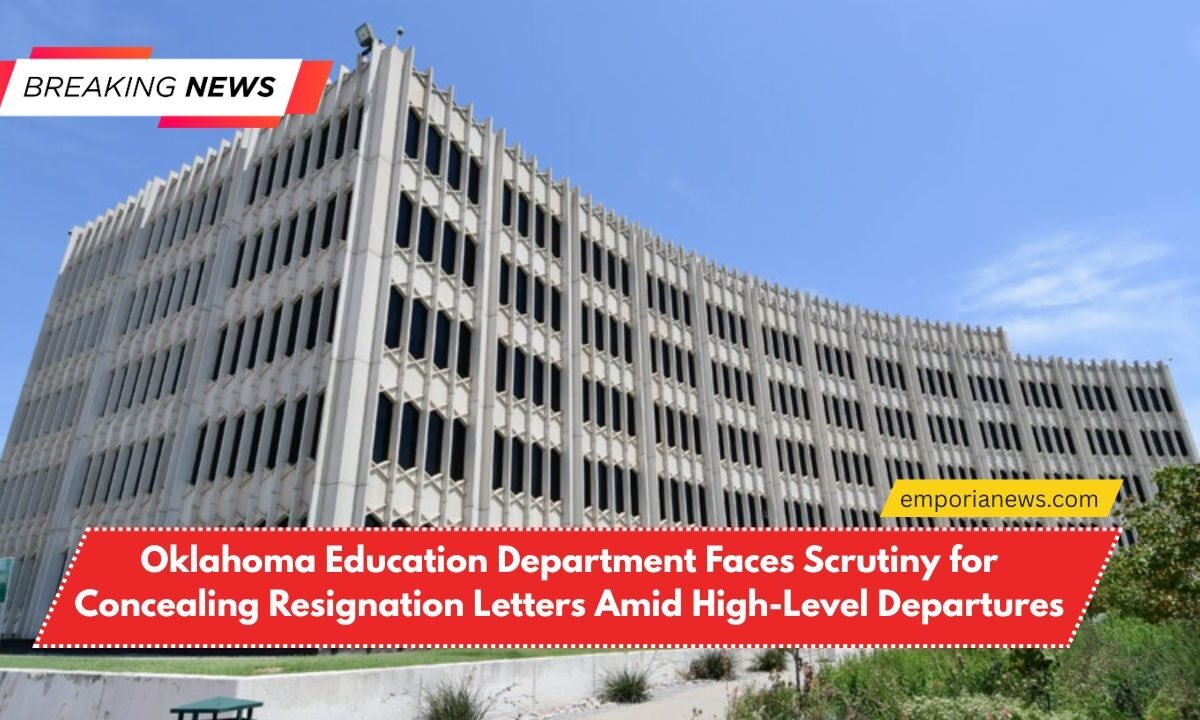OKLAHOMA CITY — As multiple senior leaders have exited the Oklahoma State Department of Education (OSDE) under the leadership of Superintendent Ryan Walters, the agency has recently adopted a new policy: withholding their resignation letters from public view.
Over the past nine months, at least seven high-ranking administrators have left the department. When Oklahoma Voice submitted open records requests to obtain these resignation letters—documents traditionally regarded as public—the agency denied access.
Even a broader request seeking all resignation letters filed since January 1 was also rejected.
This marks a major shift from previous practice. As recently as February 2025, the agency fulfilled similar requests, including the resignation letter of former communications director Dan Isett, which it released two weeks after his departure.
But following subsequent resignations from Walters’ inner circle, the department reversed course, citing employee privacy provisions in the Oklahoma Open Records Act.
Changing Policy Raises Legal and Ethical Questions
According to the agency, the withheld documents fall under a clause in the Open Records Act that allows public bodies to withhold personnel records if disclosure would be a “clearly unwarranted invasion of personal privacy.”
The department further cited another provision that exempts documents tied to internal personnel investigations, though it refused to confirm whether such investigations are underway.
Quinton Hitchcock, OSDE spokesperson, repeatedly declined to answer questions, stating: “I am unable to comment on personnel matters.”
Former Staff Push Back on Privacy Claims
Several former OSDE employees strongly disagree with the department’s rationale.
Andrea Fielding, the former Chief Operations Officer, said no investigations were underway when she and other colleagues resigned, adding that most left for personal or family-related reasons.
Tucker Cross, previously Director of Research and Policy, confirmed he wasn’t under investigation and has no objection to his resignation letter being released.
He said the letter simply stated he needed to be at home more with his family and had since committed to running their family business.
Matt Oberdick, who served as Director of External Relations until June 2025, echoed those sentiments. His resignation letter, he said, was entirely positive, highlighting his appreciation for the opportunity to work alongside Walters and crediting his departure to a new opportunity at the Oklahoma Council of Public Affairs.
“There was nothing controversial in my letter,” Oberdick said. “It was a respectful goodbye.”
Legal Action Challenges Transparency
Amid the secrecy, Oklahoma Watch and journalist Jennifer Palmer filed a lawsuit against the Education Department.
They argue that refusal to release resignation letters is a violation of the Open Records Act, which is meant to promote transparency in state agencies.
Palmer’s request for the resignation letter of former Chief Compliance Officer Kourtney Heard was denied—mirroring Oklahoma Voice’s experience.
Joey Senat, a professor at Oklahoma State University and expert on public records law, emphasized that resignation letters are often essential for identifying misconduct, mismanagement, or ethical breaches within public agencies.
According to him, “It’s in the public interest, not just curiosity.”
Senat also criticized the tactic of invoking privacy to delay or block public records requests, calling it a “smokescreen” that hides potential government failures or wrongdoing.
He added that government officials can engage in legal battles without personal financial consequences, since the cost of litigation is often covered by taxpayer funds.
Legislative Changes Aim to Strengthen Oversight
Recent amendments to the Oklahoma Open Records Act have increased agency discretion over releasing certain personnel records, making it more difficult to challenge non-disclosure in court. However, a new law passed in 2025 now authorizes the Oklahoma Attorney General’s Office to investigate violations of open records laws.
The office also formalized a Public Access Counselor role to allow citizens to report concerns over government transparency—though it declined to comment due to the ongoing lawsuit.
In 2024, Attorney General Gentner Drummond criticized Walters’ administration following a wave of complaints about its handling of open records requests.
Mystery Surrounds General Counsel’s Departure
The first known denial involved Michael Beason, the department’s former general counsel. Like others, his resignation letter was withheld under claims of employee privacy and investigation exemptions.
Beason called any suggestion of an investigation “insulting in the extreme,” asserting that he has not and is not under scrutiny and has acted ethically throughout his tenure.
He confirmed submitting his resignation on June 10, with his last day being June 30. He chose to return to private legal practice and maintains an unblemished record with the Oklahoma Bar Association for over 25 years.
When Oklahoma Voice followed up to confirm Beason’s employment status prior to his departure, the agency declined to answer—yet another reversal from its previous willingness to confirm employee roles.
This, Senat said, may also violate the Open Records Act, which mandates the release of employment details like job title and employment dates.
“We don’t have secret employees in this state,” Senat asserted.
The Oklahoma State Department of Education’s refusal to release resignation letters of senior staff has ignited legal challenges and broader questions about transparency and accountability.
Former employees insist that no investigations were involved, and some have called for their letters to be released publicly. As the case unfolds, it underscores a growing concern over how public records laws are interpreted and enforced, especially when taxpayer-funded agencies resist public scrutiny.
With new legal powers granted to the Attorney General’s Office, the coming months could determine whether government transparency in Oklahoma will improve—or erode further.




